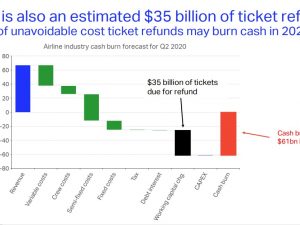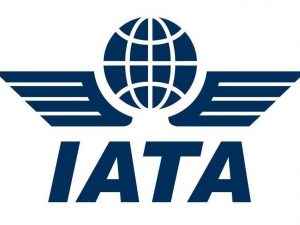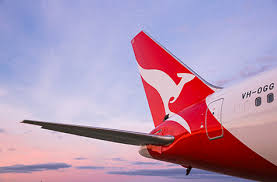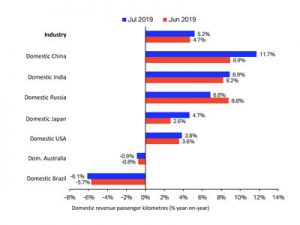According to the latest data provided by International Air Transport Association (IATA), the airline industry could be staring at an estimated $35 billion of ticket refunds. This, clubbed with significant fixed and semi-fixed costs of which many cannot be avoided over a short period of time, can amount to the airline industry using up to $61 billion from its cash reserve in the second quarter (Q2) of 2020. This comes after IATA’s impact assessment released earlier, which showed that the industry was looking at a net loss of $39 billion in Q2 2020.
Read More »Airlines to post quarterly net loss of $39 billion, witness 71% fall in demand during Q2: IATA
The International Air Transport Association (IATA) has published new analysis showing that airlines may burn through $61 billion of their cash reserves during the second quarter ending 30th June 2020, while posting a quarterly net loss of $39 billion. The analysis is based on the impact assessment released by IATA, under a scenario in which severe travel restrictions last for three months. In this scenario, full-year demand will fall by 38 per cent and full-year passenger revenues drop by $252 billion compared to 2019. The fall in demand would be the deepest in the second quarter, with a 71 per cent drop. Revenues are expected to fall by 68 per cent. This is less than the expected 71 per cent fall in demand due to the continuation of cargo operations, albeit at reduced levels of activity. Variable costs are expected to drop sharply—by some 70 per cent in the second quarter—largely in line with the reduction of an expected 65 per cent cut in second-quarter capacity. The price of jet fuel has also fallen sharply, although we estimate that fuel hedging will limit the benefit to a 31 per cent decline. These changes to revenues and costs result in an estimated net loss of $39 billion in the second quarter.
Read More »Airline revenues in 2020 to decline by 44% compared to 2019: IATA
According to the International Air Transport Association (IATA)’s latest analysis, the annual passenger revenues will fall by $252 billion if severe travel restrictions remain in place for three months. That represents a 44 per cent decline compared to 2019. This is well-over double IATA’s previous analysis of a $113 billion revenue hit that was made before countries around the world introduced sweeping travel restrictions. Sharing his remark, Alexandre de Juniac, Director General and CEO, IATA said, “Failure to act now will make this crisis longer and more painful. Some 2.7 million airline jobs are at risk. And each of those jobs supports a further 24 in the travel and tourism value chain. Some governments are already responding to our urgent calls, but not enough to make up the $200 billion needed,” he said. In urging more government action, de Juniac demanded Direct financial support by government to passenger and cargo carriers to compensate for reduced revenues and liquidity attributable to travel restrictions imposed as a result of COVID-19, loans, loan guarantees and support for the corporate bond market by the Government or Central Banks and rebates on payroll taxes paid to date in 2020 and/or an extension of payment terms for the rest of 2020, along with a temporary waiver of ticket taxes and other government-imposed levies.
Read More »EU suspends ‘slot use’ rules till June 2020
The International Air Transport Association (IATA) welcomed the announcement by the European Commission (EC) granting the temporary suspension until June 2020 of the 80-20 ‘use it or lose it’ rule for airport slots. The decision reflects the unprecedented situation facing the airline industry. However, granting the suspension only until June is the very minimum the industry needs, and a decision on a full suspension until October will be needed within the next month to allow airlines to plan their schedules. The COVID-19 virus has caused a collapse in global air travel demand. Owing to the requirement to continue to operate an airport slot for at least 80% of the time, airlines have been unable to respond by adjusting their capacity. The suspension of the slot use rules until June will allow airlines to begin putting in place measures to cope with the unprecedented fall in traffic, but it is a shorter period than airlines had requested. Airlines need the suspension to be extended to cover the whole season (to October), as other regulators worldwide have already agreed. The EC will therefore need to review the extension request by April 15. “Airlines are in crisis. The collapse in demand is unprecedented. And airlines are struggling to match capacity to the fast-changing situation. The Commission’s decision to suspend slot use rules until June means that airlines can make these critical decisions immediately—without worrying about the impact on future availability of slots. This is much needed and most welcome. However, given all the uncertainties, it is disappointing that the decision does not cover the full season,” said Rafael Schvartzman, IATA’s Regional Vice President for Europe. The Commission’s decision will benefit airlines, airports and …
Read More »India to displace UK to be the 3rd largest aviation market in 2026: IATA
In IATA’s recently released 20-year air passenger forecast, India will displace the UK to be the third largest aviation market with 278 million passengers in 2026. More passengers mean bigger crowds and more stringent security requirements, adding up to longer queues and greater potential for disruption. These factors could be why travellers are increasingly prioritising comfort over more functional concerns such as cost and efficiency.
Read More »Qantas reduces agent commission from 3% to 1%
Effective March 1, 2020, Qantas Airways Limited, flag carrier of Australia, will reduce the IATA BSP Travel Agency Commission to just one per cent for Qantas tickets issued in India. All Qantas tickets prior to March 1, 2020 will be eligible for the current 3% per cent IATA BSP Travel Agency Commission. The airline recently cancelled nearly one in ten flights on the busy Sydney-Melbourne corridor in the six months to November 2019, according to Australian Government statistics. The route is one of the busiest in the world and Qantas operates up to 46 return services a day at 15-minute frequencies in peak times.
Read More »Global air passenger numbers to reach 4.72 billion in 2020: IATA
Air passenger numbers across India are expected to reach 4.72 billion in 2020, according to International Air Transport Association (IATA). The forecast shows an increase of 4% from 4.54 billion in 2019. A statement, released by IATA, said, “Passenger demand (RPKs) is expected to grow 4.1% in 2020, in line with 4.2% growth in 2019. In fact, this masks a GDP-growth-driven pick-up since the underlying growth rate fell to less than 4.0% in 2019. However, whereas passenger capacity (ASKs) rose 3.5% in 2019, it is forecast to grow 4.7% in 2020 – as aircraft deliveries rise significantly, causing load factors to slide to 82% from 82.4% in 2019. This will maintain pressure on yields, which are expected to slide 1.5% after falling 3.0% in 2019. Passenger revenues, excluding ancillaries, are expected to reach $581 billion (up 2.5% from $567 billion in 2019).
Read More »IATA to adopt worldwide airport slot guidelines to help new airlines get slots at Indian airports
The International Air Transport Association (IATA) is in talks with the Indian civil aviation officials to adopt the worldwide airport slot guidelines which will help new airlines get slots at various airports in India. Once adopted, more international airlines will be able to fly into India, connecting more cities worldwide and it could also help the UDAN scheme. As per the guidelines, new entrants which could either be new airlines or those who have not operated from a particular airport will be allowed three daily return flights. Once these slots are used up, that particular airline will not be allocated new slots but will have to bid for the next phase of expansion. (Source: The Hindu Business Line)
Read More »India’s domestic traffic rises to 8.9% in July compared to 8.2% in June: IATA
The Indian domestic Revenue Passenger Kilometres (RPK) market recorded an 8.9% annual growth rate, up from 8.2% in June, reveals IATA Air Passenger Market Analysis. The market has not yet returned to the double-digit growth rates that were the norm in the past 4-5 years. Yet it seems to be adjusting well to the disruption caused by the demise of Jet Airways; capacity is also back on track (7.1% yoy in July vs 3.4% in June).
Read More »Average return fare for global airlines was 60% lower in 2018 as against 1998: IATA
The average return fare in 2018 was 60% lower than in 1998, before taxes and surcharges, while the cost of air freight ($/Kg) was down 61% over the same period, stated Alexandre de Juniac, Director General and CEO, International Air Transport Association (IATA), in the IATA World Air Transport Statistics (2019 WATS), where they released performance figures for 2018 . He added that aviation is good for local economies too— $843 billion in tourism spending was made possible by air travel last year, while governments collected $129 billion in tax revenues from airlines and air travel.
Read More » Tourism Breaking News
Tourism Breaking News



